#alls I’m saying is that you cannot be adopting/assimilating entire cultures into your own and not expect some loan words
Explore tagged Tumblr posts
Text
Y’know, considering all the mass-adoption and assimilation Mandalore has done, Mando’a probably has some of the craziest differences between regional dialects.
You will NEVER be able to convince me that clan Wren and clan Vizsla speak the same Mando’a. They probably have an easier time communicating with each other in Basic than their native language.
Just an absolute clusterfuck of a language, the Romans would pity them.
#lmfao#alls I’m saying is that you cannot be adopting/assimilating entire cultures into your own and not expect some loan words#not even gonna mention how sentence structure’s bound to get edited constantly#THESE FUCKERS DON’T EVEN HAVE A SOLID NAMING CONVENTION FOR CHRIST’S SAKE#the only reason standard Mando’a remained unchanged since kotor was because the clans needed a way to communicate with each other coherentl#otherwise they are speaking with accents so thick and slang so specific that the houses wouldn’t even be able to coordinate during wartime#star wars#mandalorians#mandalorian culture#meta#me rambles
335 notes
·
View notes
Photo

Colonizers are something else…
—
This entire thread is evil. I have no other way of describing it.
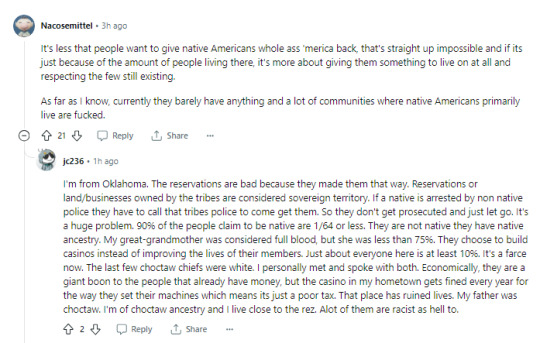
“The reservations are bad because they made them that way.”
No, reservations are in poor condition because when the government finished killing most of us, they shunted the survivors onto prisoner of war camps situated on shitty land in the hopes of breaking our spirits so badly the last of us would die out.
I’m not even going to bother addressing the rest of the reply because it’s sneering at mixed Natives over blood quantum, something the federal government invented in order to “breed” the Indian out of us.

People tend to misinterpret decolonization through a settler lens. Because they personally cannot conceive of a scenario in which Native people are stewards of the land because their ancestors took it through industrialized violence and force, they automatically believe Indians would seize power in some bloody coup if given half the chance. Yet they don’t realize the contradiction inherent in believing we’re too small and weak to affect such change while also believing we’d play the part of violent savages.
Which is it? Are we too dangerous, or too stupid, for our own good?
This is literal fucking fascist thinking.

Nobody in this Chili’s knows how tribal adoption practices and mourning raids work, and I wish they would all shut up about it.
When tribes went to war, they lost people. Mourning raids - called such because of associations with grief over those lost - would be conducted as a form of compensation in which families, usually women and children, from the enemy’s side would be captured and adopted into the tribe.
While I won’t lie, slavery did take place among Native tribes, this particular Redditor is acting as though mourning raids and slavery are equivalent, which is erroneous.
It wasn’t assimilation in the sense that colonization is assimilation, because assimilation requires a complete shedding of the previous identity, while adoption did not. The adopted were allowed to retain some of their old ways, which were instead integrated with the new.
People who act like the settlers and the Indians threw hands the moment they clapped eyes on each other due to some assumed inherent incompatibility are selling you some heavy fascist historical revisionism, and I am not exaggerating in the slightest when I say that. Because this is also not accounting for the fact that some settler demographics we think of as white today managed to find common ground with us even outside of the context of adoption. From what scant I understand (and I apologize if I’m inaccurate), this mixing of cultures into a unique culture, neither strictly one or the other but both, is the basis of the Métis. In addition, I’ve read about Highland Scots and Natives peacefully coexisting due to similarities in culture and histories of oppression by the imperialist machine.
Of course, regular old adoption sans war takes place as well (present tense, because we still practice it). There are records of colonists confusing adoption for sacrificial rites: the most famous case being John Smith’s.
You know why he made up that story of Matoaka (her name’s not Pocahontas; also, she was ten) rescuing him? Because, in addition to having a fetish for making up stories where a Beautiful Exotic Girl from whatever culture he was annoying at the moment rescued him from ~a most horrible death~ at the last minute (ew), he saw something he didn’t understand and he was like
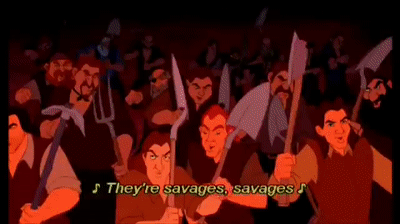
Call it assimilation if it makes you feel better, but you should really know that mourning raids were considered a way of strengthening the tribe by bolstering numbers, since we don’t consider skin color a factor in one’s indigeneity. You could be the blondest, most blue-eyed, most pale-skinned white person in the world, but if your tribe recognizes you as one of their own, that’s it, you’re one of us now. No questions asked.
Also, because you’re considered a part of the tribe once you’re adopted, you’re not supposed to talk about it in a way that draws special attention to it. Talking about it in such a way implies invalidity. You wouldn’t draw attention to the fact that your adopted children are adopted over your biological children when both are your children. Making a distinction is just shitty.


That’s not how landback works, you fascist ignoramus. You are literally espousing White Replacement Theory.
The brainrot has left them so bereft of critical thinking that they can’t possibly conceive of the notion that fighting for the right to sovereignty and self-determination is not colonization.

Actual Manifest Destiny bullshit.
I’m… legit in awe.
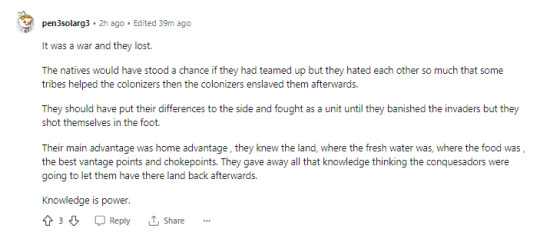
Ah yes because victim-blaming never gets tired.
“They should have teamed up but they hated each other so much that some tribes helped the colonizers then the colonizers enslaved them afterwards.”
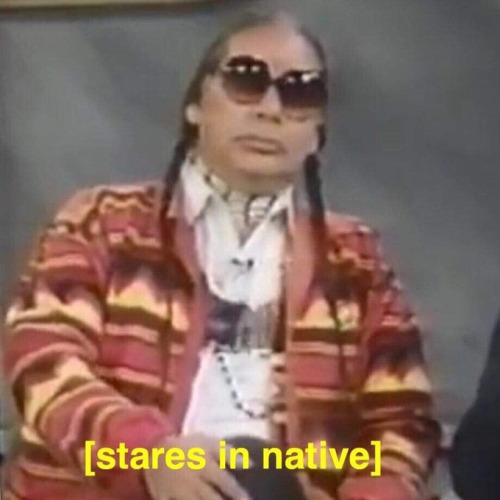
(stares in Haudenosaunee, literally a “confederacy of Six Nations” which came together in peace hundreds of years before colonization)
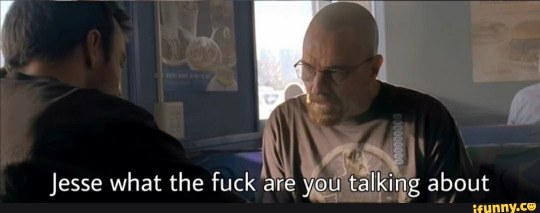
Also, they’ve got it backwards. The colonists did the enslaving first, and because Indians were the most convenient “resource” in the early days, they shipped Native people off before the chattel trade.
Knowledge is power indeed.
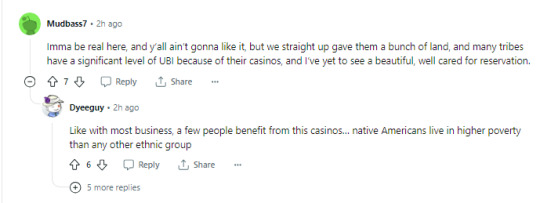
“We straight up gave them a bunch of land, and many tribes have a significant level of UBI because of their casinos, and I’ve yet to see a beautiful, well-cared for reservation.”
A.) God, I wish we had UBI. Not every tribe gets UBI, much less from “casinos.”
B.) A bunch? Bitch where? Reservations can’t even be called pittances because they were a tactic of assimilation, not an offer of generosity.
And as my own tribe’s history proves, the state is always trying to encroach upon even that. We gave you all this land, except when we need it to build a dam. Then we’ll take half the rez and bulldoze your farms and homes, forcing you to relocate on the place you were originally forced to relocate to. Because you clearly weren’t using that land, you see. Aren’t we so generous uwu.
C.) It was shitty land, land believed to be uninhabitable and unfarmable because again, the intent was to break the survivors’ spirits so badly that they would have no other choice but to die out or assimilate. And when it turned out sometimes that land turned out to have some hidden resource, like oil, the Natives were murdered over it. Killers of the Flower Moon wasn’t fiction.
D.) Reservations were originally PRISONER OF WAR CAMPS, you fucking heartless bastard.
E.) The aforementioned coupled with trauma and the intergenerational transmission of poverty (nobody hires Indians if they act “too” Indian, thus perpetuating the cycle) are the reasons most reservations are destitute. You made this shithole, stuck us in it, and now cluck your tongue at us for not sweeping up. Unreal.
F.) Assuming reservations aren’t “well-cared for” is racist, and the mere expectation that they’d be neat and tidy after we endured, essentially, genocide to the point of apocalypse, is utterly heartless.
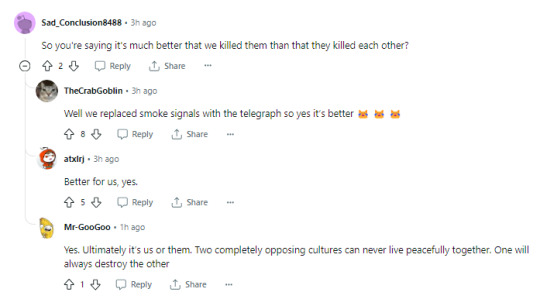
“Two completely opposing cultures can never live peacefully together.” - oh you must be a joy to have at parties
“One will always destroy the other.”
I would now like to direct your attention to the Two Row Wampum. It is the peace treaty between the Haudenosaunee and the Dutch settlers:
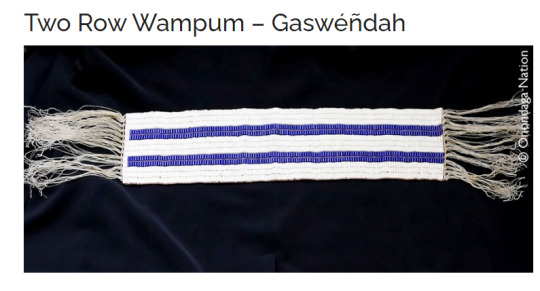
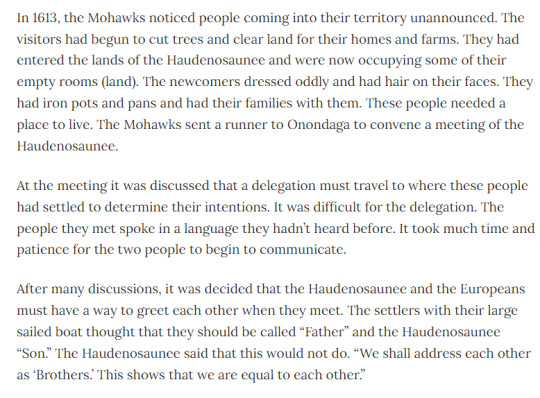
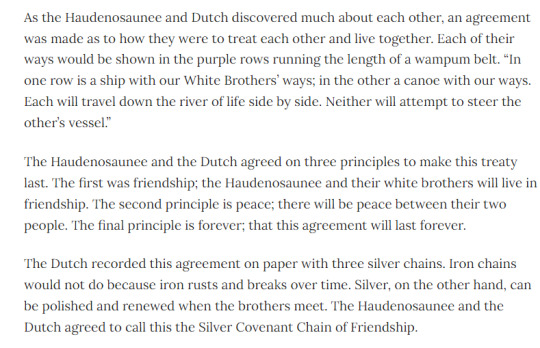
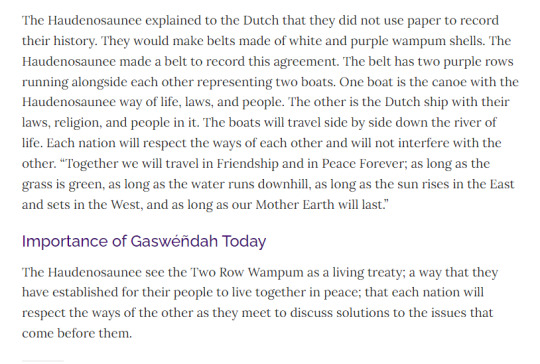
The metaphor being that, although our ways are different and we may not always see eye-to-eye on certain matters, we can coexist in peace, or row down the river in parallel, as equals.
“Neither will attempt to steer the other’s vessel,” “Together we will travel in Friendship and Peace forever” - what was that about Natives inevitably foisting colonization and violence onto everyone else because Muh Evil Human Nature? sorry I can’t hear you over all this ding dong you are wrong
oh but ig the Two Row Wampum doesn’t count because we were all such bloodthirsty savages, right. We saw settlers making homes for themselves and we didn’t convene or discuss the matter in a peaceful and organized manner or extend them any help. Our savage minds were automatically like crush maim kill destroy and that’s why boarding schools are justified.


Funny because we believe no one owns the Earth, either. Funny how we already believed that.

Your friendly reminder that Natives were beaten, killed, and arrested for practicing their spirituality until the seventies.

“sometimes I can still hear their voices”
—
That’s it. Jesus. Which one of you ungagged Governor Radcliffe?
This entire thread is trash and just ignorant fascist talking points. While normally I would ignore it, I feel compelled to point out that this shit was posted three hours ago. A veritable case study in why it is always morally correct to punch fascists in the face.
3 notes
·
View notes
Text
Of Politics and Road Trips
Welp, it seems like the time has come to address one of the gnarliest and most frequently asked questions of all time. To be clear, that's gnarly for me and to me, respectively. I’d also like to memorialize a recent road trip. Before I start, though, let’s get grounded in the current context: it’s late summer IN MARCH; We are headed intro autumn, and there has been enough early snow that Mount Hutt was open for skiing (what?!?!). I started my new job at Jade Software; the kids started a new school year in January, with Anily headed off to her first year of high school (5 years of high school here); both kids have changed to a new soccer club, which is much closer to the house (thank god); Anily made the A team; James is playing soccer and basketball and ridiculous amounts of Fortnite. It’ll soon be a year that we’ve been here. We are right in the middle of a full 12 weeks of visitors and trips from/to the US. And in case you were wondering, the cat has managed to escape through open windows and doors a few times, but he’s always come back so I guess he’s ours for real :-)
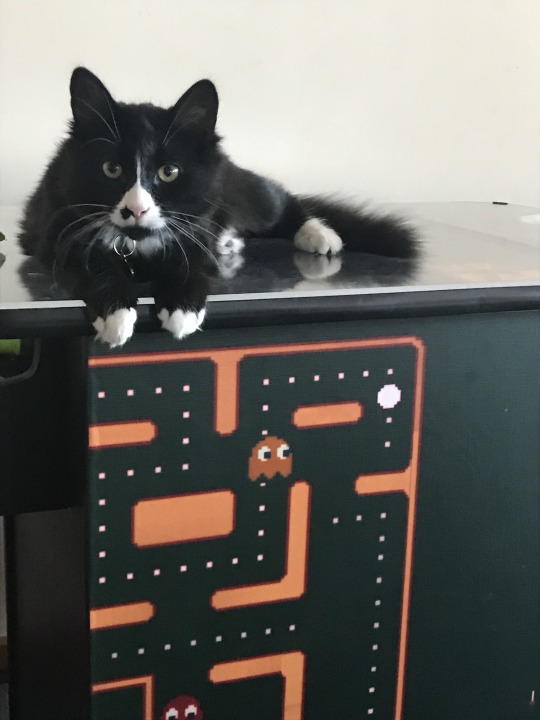
I still haven't submitted my dreadfully complicated tax return. I am seriously procrastinating, and having visitors and reasons to road trip is helping/hurting.
So! BFGFAQ (big fat gnarly...you get it): It’s the political one. From the Kiwis this usually comes in the form of “are you a Trump refugee?” or “what do you make of what’s going on over there?” And even if it’s not an explicit question, how can I possibly answer the most frequent Q of all time -- “why did you move to New Zealand?” without considering how the political landscape of the US factored in? I mean, you don't just up and move across the globe and leave a great place and a fabulous life without at least a mental checklist of pros and cons. At least, most of us wouldn't. And if you’re a grown-up (which we sadly have established that I am) and a contributing, aware, member of society (which I would argue that I am), your list must include considerations of the way your taxes are spent and people are treated in the place you live and how the outcomes of those things impact your lifestyle, your life, and the lives of other human beings. Right? Right!
MAJOR UPDATE: A handful of days after I posted this, someone (likely an asshole white supremacist) shot and killed people in a CHCH mosque. The city is still in lock down as I write this. It is terrible and sad that things like this happen anywhere, ever. And I just want to say that as you read the ideas below, I’ll be watching closely the response of the NZ government.
If there’s one thing that moving around the world to a place you’ve never been before, with a small family and no friends, and taking up a real life with a paycheck and a rent and a job does really well, it’s create an opportunity to reflect on the differences between where you were and where you are. It also is extremely useful for considering, in a very real way, how the values you hold are (or are not) reflected in both a political system and a local way of living. You really notice how political decisions, socioeconomic forces and cultural norms trickle into investments, infrastructure, bureaucracy, language, aesthetics, and interactions that impact you as you move through your day-to-day and learn how to get things done. And because you’re an observer who is trying to become an insider, you may operate with less bias and pre- disposition to judge, more of a natural curiosity and interest in gathering information and then assimilating it and deciding over time. Chalk one up for perspective! Happy to say this was the kind of experience and growth I hoped we’d all get through this adventure.
Now, from the Americans this question usually comes in the form of something like “OMG, are you so glad you’re not here for this?” or “are public healthcare and lack of gun violence really as amazing as they seem from here?”. Because, like me, most people I talk with on a regular basis feel something like this:

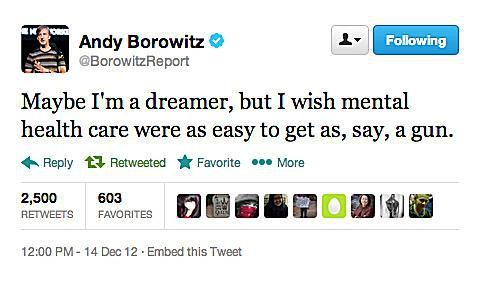
t least you do now, thanks to Willie Wonka’s and friend above, and this:

So while I am not here in NZ without political bias or personal ideas of what’s right, wrong and important, I am more open minded to considering what’s good for this country and this context, and I have a stronger appreciation for the complexities of things all across the board since I’ve now gathered more data and had more experience.
So, my American friends, in the interest of helping you draw some of your own conclusions, here is a segment I like to call Fact, Figures and Feelings:
America is amazing. You have SO much of everything. Including great food, tons of money, vast political power, and a really noticeable amount of homeless people. I mean! When I was in San Jose I felt so conflicted by both where to go for every meal and the fact that to get where I wanted to go I was uncomfortable with my own feelings and anxiety about possible conflict with the homeless and mentally ill folks I passed constantly. And it was often while I was walking into a convention center full of people trying to give away millions of dollars, listening to speakers who had made millions through technology. And while the dog adoption station on site and the furry friends in it made me feel a little better in the moment, could there be anything more cliche? Embarrassing. And yet is it fundamentally bad to have cute dogs making rich people feel good and maybe getting adopted? No. But it maybe uniquely American.
Know what else you have a lot of, USA? DRAMA. Seriously. The NZ morning news is usually about 25-50% reporting on the shitshow that is US and Brexit, and it turns out that when people say “if you get homesick, just listen to the news” they are correct.
So what about NZ? Well, when you live in a country with SO MANY FEWER (like so many!) people and a much smaller GDP, your reality is very different. Not so loud. Not so busy. Not so many options. Much much simpler and frankly, it feels more sane. But we know the Mexican food sucks. So... six of one/half dozen of the other? This is what I am saying: I cannot tell you if Enchiladas and Aveda products make up for dealing with the opioid crisis if you’re seeing it every day, or if leaving Tito’s vodka and a much higher salary on the table is balanced out by the fact that police here in CHCH carried guns last week and this is how people think about it:
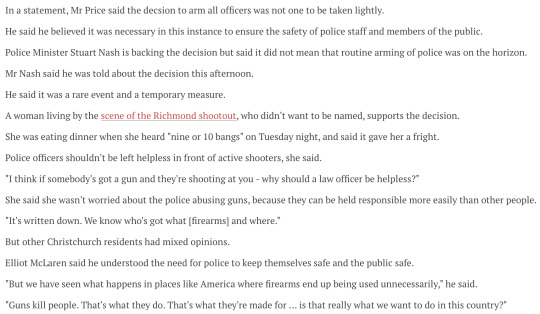
FUN FACT: During the “summer holidays” (December-Jan), the morning news show on public radio literally went off air. They replaced it with special summer programming, mostly dedicated to personal profiles and reviews of music and activities. The only headlines they read each day were almost entirely about the US (shut downs) and UK (Brexit). Apparently it’s possible for time off to extend to politics and news. WOW. Just notice how you feel about that.
Now, NZ is certainly not the rainbows and unicorns utopia we liberals like to think a place with a public healthcare system and affordable education and far fewer guns will be -- there’s a growing imbalance in the distribution of wealth, the abortion laws are archaic, affordable housing is a big issue, nurses and teachers strike because they don’t get paid enough.
Politics was not the only motivator for our move, but we considered it -- sure seemed like a nice time to be out of the US, and it is. It’s certainly not a clear #NZFTW-100% -they -nailed-it situation, though. Every place and every system has its bad sides, and I have a lot to learn to really decide how the pros and cons balance out. All I know is that it’s really, really nice to be in a place where the political conversation is much simpler and more focused on politics and their outcomes on people than on hateful rhetoric. I am disappointed when I think of the lost opportunity due to the amount of resources you are wasting on unproductive, unkind conversations in the USA, when you have so much. I feel bad for not being there to help stand up for the rights of people I believe in, but when you don't wake up angry every day at the headlines and the people you share space with, when the dialog is a little more open and productive, when the headlines are not so likely to be violent and sad, you start with a much better mental health baseline. You just can’t eat a great caesar salad whenever you feel like it, and it’s expensive as hell to leave the island and you don’t get paid enough to be able to do it often, which may really stress you out. For now, I’m really ok with it. But over time will the flaws in the NZ system (every system has them) outweigh the positive? Do the opportunities in the US outweigh the negative?
In the interest of letting you form some your own opinions: Take a look at the the top headlines of 2018 in New Zealand. They include a pregnant PM; visits from Ed Sheeran, the Royals, and Obama; a handful of natural disasters; a bunch of news about other countries and sports; and the BIG BIG Drama which “unfolded over several deeply uncomfortable days” and ended in a minister being briefly admitted to a mental health facility and broad discussions about mental health. Consider if the US was as concerned about its politicians’ mental health when they did crazy shit :-).
Oh also, this is my CEO at work on Friday (hee hee):
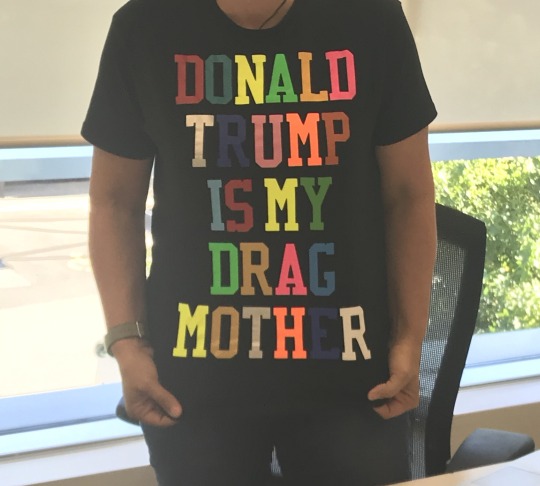
So far this year Lime Scooters (people get hurt on them, and people break the rules and double ride with no helmets -- gasp!) and the potential of a capital gains tax have been in the news pretty much daily. And that’s about it. Boring? Yes! Nice? Also yes! Did you know NZ is the only country in the OECD to not have a CGT? Are you impressed with my knowledge of initialisms? Worldly is the word you’re looking for to describe me.

I know, it looks like I am pooping on a trail, but I am actually doing squats mid-hike IN A SKIRT. Probably gives me enough credibility to become a world leader, or at least present these numbers for your consideration:
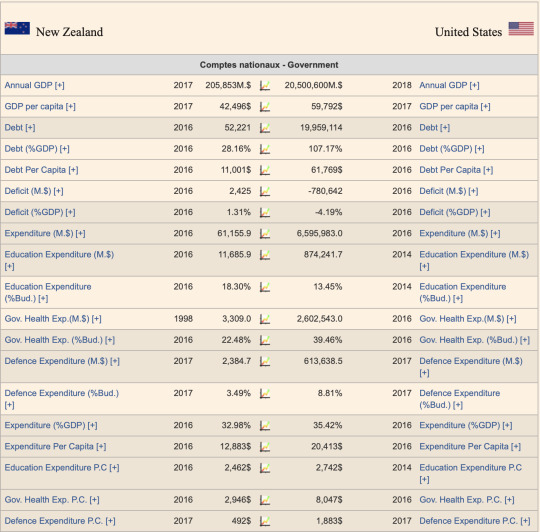
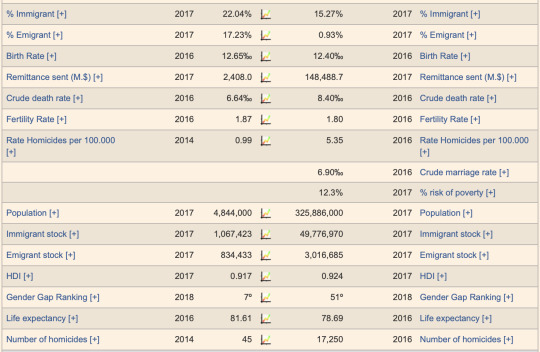
Now that you have something to think about -- because you weren't already thinking about politics enough (sorry!) -- let’s turn to a less political, but more important spiritual and philosophical topic: The Art of the Road Trip.
Pro tip: It’s easier to be a Road Trip Rembrandt with the right tools -- like these:
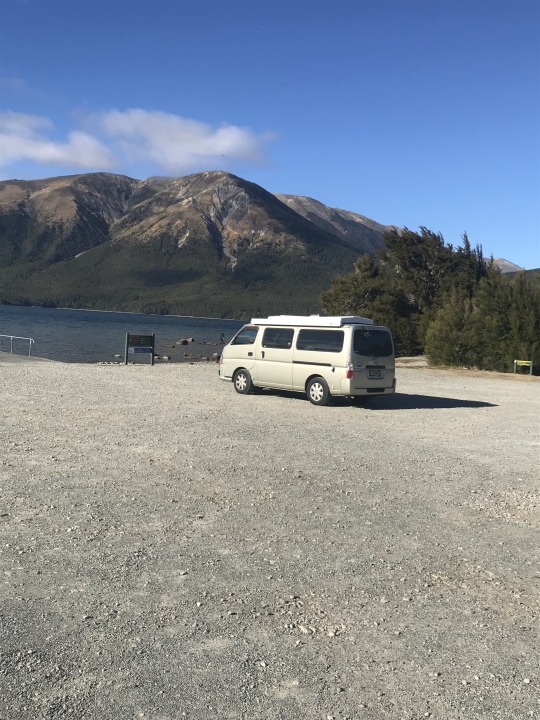
Mountains + Vans = Roadtrip Masterpiece
I think I mentioned in an earlier post that one of the things we’ve been doing a lot of is road tripping. Not so different from Seattle, eh? True. But since we can surf so close to the house and we have such a beautiful country to explore and a slightly less active social life, the road trips are more frequent and more varied. As we are all happiest when we’re in the flow and hitting the right balance between challenge and success, I guess it makes sense. Because if I do say so myself, we are damn good at the road trip, but there’s no way to have 2 to 6 people in a small space with a lot of stuff and a windy road ahead and podcasts and music to choose without challenge.

#vanlifeisthebestlife.
Here’s a map of where we’ve been on our travels thorough the country so far:
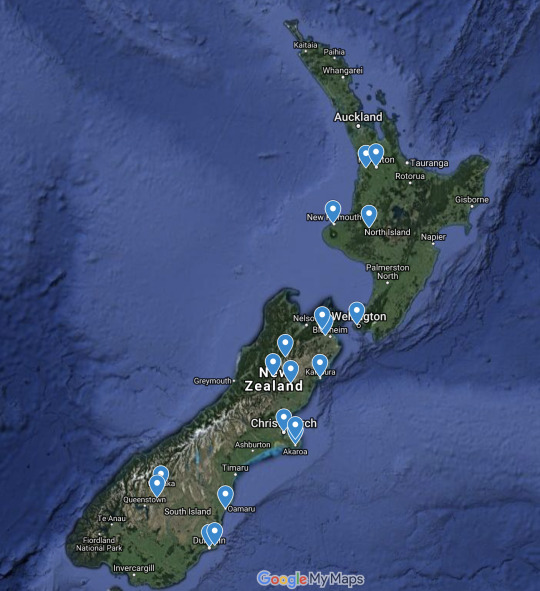
So what’s the art of the road trip? Composition:
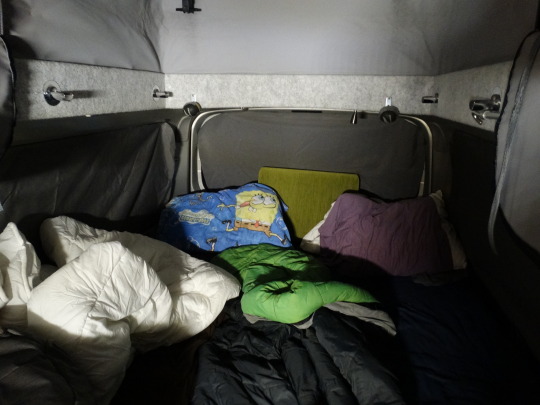

And the science? One part great music, one part planning, and at least two parts having a sense of humor and joy about all the chaos.
Like when there’s no where for you to sit:
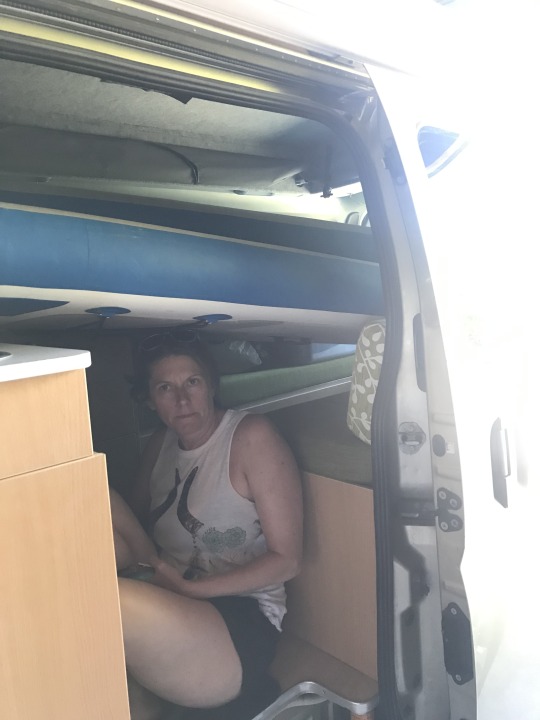
My most recent road trips were extra awesome due to the fact that Leslie Lapham (AKA Alex, AKA LL) was here and we took off on a few fun adventures. Now, Leslie is great for a lot of reasons and it was super fun to have her here for 5 weeks...and one of her best qualities, she takes great pictures!
Here’s what I like to say about our first trip: it started with a bang and ended with a bee sting.
Here’s the bang -- this is what happens when some dickhead decides to pass you on the right at high speed on a highway while you are TURNING RIGHT into a campground:
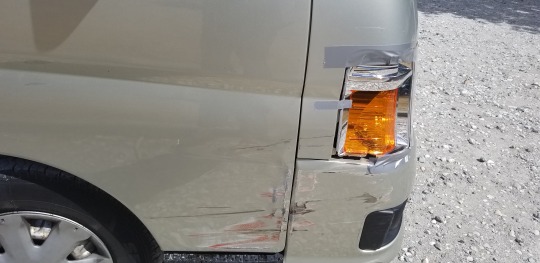
So, that sucked. Especially because aforementioned dickhead did not stop to see if we were ok, just left us there in the dark on our own. Luckily the Taupe Donkey was still drivable and packing enough duct tape to make it work. So, off we headed from Kaikoura to make ourselves feel better in the vineyards and wineries of Marlborough.

The Cloudy Bay Winery was not a bad place to spend an afternoon!

Watson’s Way (not pictured) was a really weird place to spend a night though -- we were basically parked in a gravel parking lot in someone’s yard. But man, did we have some good food!

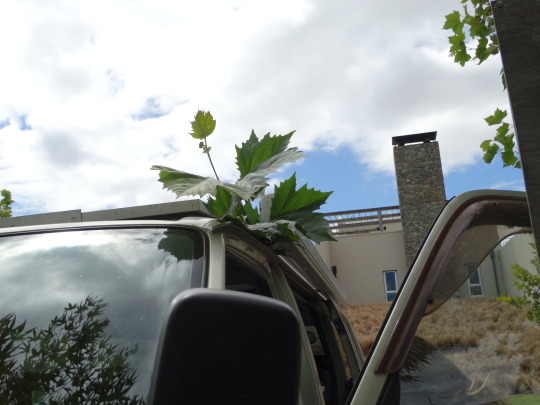
Although oops, I accidentally tried to take a grapevine as a souvenir. And I swear this was before I even did a tasting!
After wine tasting and an amazing dinner at Arbor, we headed to the Marlborough Sounds, starting at Havelock, the mussel capital of the world!
We did a cool tour on the mailboat, which literally delivers mail, packages, animals, groceries, and god knows what else (possibly the odd tourist by accident?) to the residents of the remote 300 or so bays in the region, which can only be reached by boat.

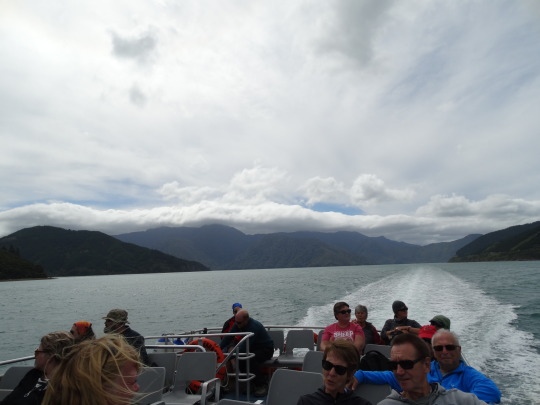
We ate a lot, of course. But we ordered more than we could eat.
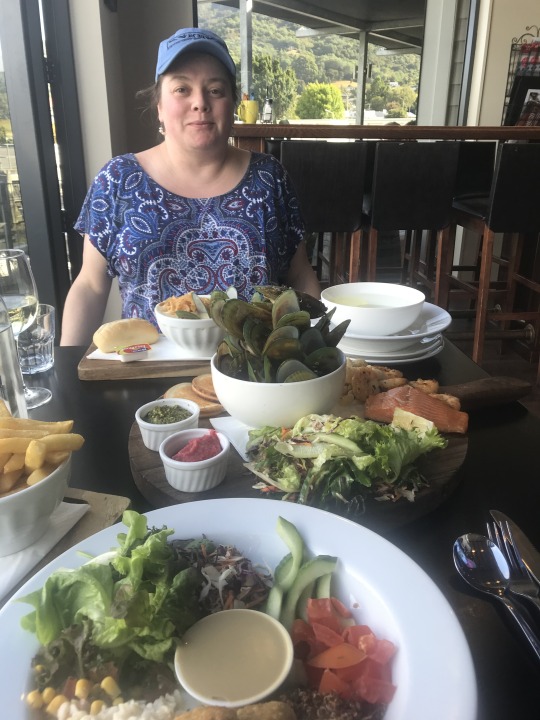
After that we headed south on the inland route and camped overnight at the Tasman Lakes National Park.
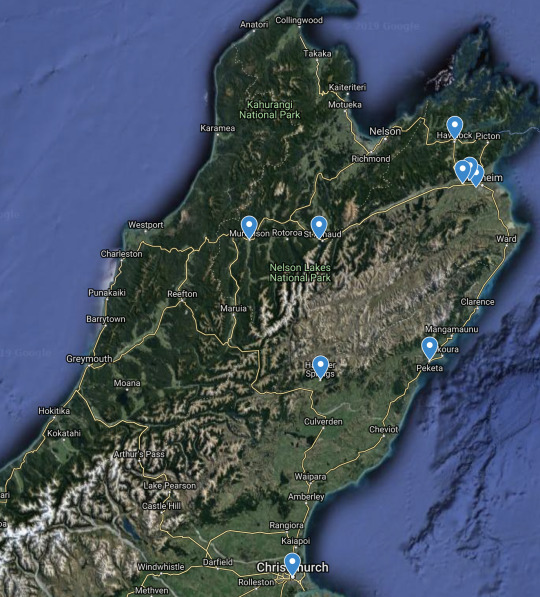
There were eels, pretty views, and random dock yoga.
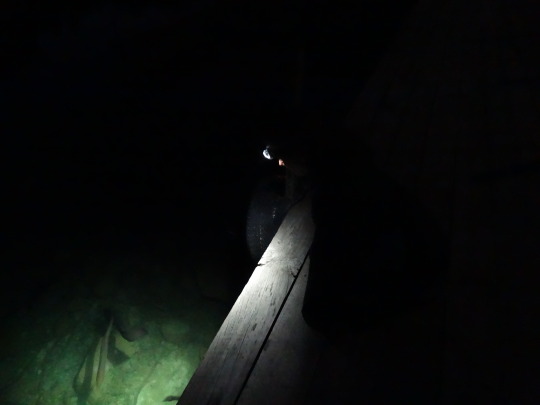
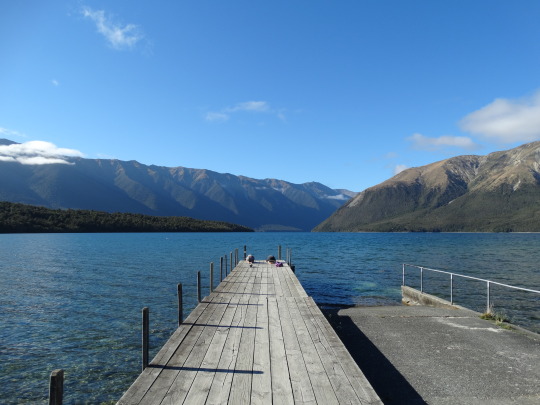
And last but definitely not least, we topped off the trip by meeting Jason at the always fabulous Hanmer Springs Thermal Pools. What a drive to get there, too! I did get stung by a bee while I was soaking, which was a total and pretty painful shock, despite the signs warning people to watch out for bees. Little fuckers!
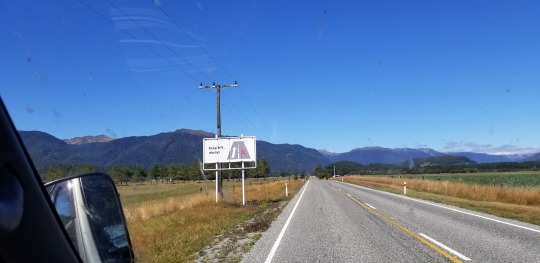
After that, back to co-working and a couple weekends in CHCH:


Then...Lois!!!
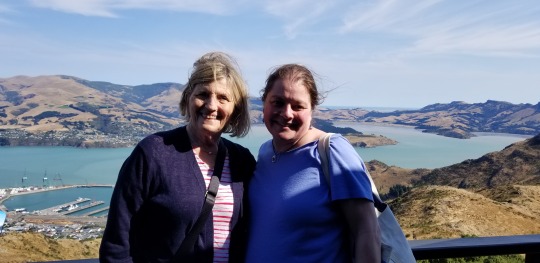
Now this blog is not about all the visitors and it’s already so long I dare not start going on about having Leslie and Lois here together. Suffice it to say we had some fun times, some great food, and after 8 hours in the emergency room we did a quick road trip to Oamaru. There were PENGUINS!!!!


There were penguins!!! We saw them waddle onto the beach at dusk after swimming 50K through the ocean all day. Alas, you cannot take pictures of them, so you’ll have to settle for 3 Generations of Wachsmuth Women in the Wild until next time. XO.

2 notes
·
View notes
Text
i think there's something to say about how much english is valued in the whole entire world, in different parts, and how it's undeniably a status symbol.
in india, of course it is, english (the language) and furthermore english (the culture!) are relics from our colonial past that cannot be classified as 'relics' because your knowledge of english does determine your opportunities.
beyond aspects of like the job market, that i admittedly don't know anything about, it's really important to recognise how your knowledge of the english language can function as a sort of unconscious bias?
as in, how there's always some element of shame (that you're forced to internalize in schools many times) in not being able to speak english fluently. how english as a language is accorded such a central position in determining your intelligence, and in extension many times, your worth?
at how teachers treated you more respectfully, or rather more favourably if you spoke good english.
(i'm sure and also hoping that my experiences aren't universal, but i spent my early years of schooling at a convent and there is no denying that the whole 'convent educated' and 'english medium' student is seen as something very desirable, in india.)
apart from that, after internalizing the apparent worth of the english language, one comes to the point of thinking for themselves. and what followed, in my case at least, was this sort of pride in my ability to speak the language, or having some command over it?
the school that i grew up in, it was common practice to poke fun at someone's mispronunciations, any muddling of tenses or grammar, and it did take me a long time to unlearn that and realise how disrespectful it is to mock someone for how they speak.
but what i'd like to emphasize is that we would do this only for english, even if there were jokes made about anybody's lack of fluency in any other language, it was clear that there was no malicious intent behind it. this i can say for sure is because the authority figures, our teachers, would very openly mock students who would make mistakes while speaking english.
it's important to note how knowledge of the english language is equated with being smart and capable; it's an unconscious bias and god, it's so difficult to be rid of it considering how engrained it is in our psyche.
i think something i've continued to struggle with, especially now, is how i have gone from being somewhat proud of my ability to speak better english than other languages (and that i consumed english media!) to being rightfully disappointed that i couldn't write anything as long as what i have written up till now in my mother tongue.
in a lot of the content i consume, even if passively, i see how this bias seems to exist in people of indian/south asian origin in u.s.a or the u.k (just generally the 'west').
it's treated as a joke, a very central part of these skits that among other things highlight the difference between the parent and the kid, and these are the classic kind that lilly singh popularised a long time ago.
i can't help but be hyperaware of how the more indianised parent (who has a very distinct 'indian' accent, mispronounces words, and just has this very identifiable manner of speech) and the more westernised kid (who usually has a british/american accent, speaks more calmly).
i don't mean to hate on these content creators, and genuinely, i don't!
i lack any experience to really dictate what their experiences with their families are like and the inter-generational nuances of assimilation to another cultural environment, but it is a little strange.
another thing about the whole english-as-a-status-symbol thing is that something very central in the indian 'i'm not like the other girls' phenomenon was that the 'cool' kids consumed british/american media (tv shows, music, cinema, youtubers!).
(i emphasize on girls because i don't have any clue about how it affected guys, because my school had none.
and also that my phase occurred at the same time as my sister's did (and she was five years older so).
i used to think i was special or somewhat smarter than other kids my age because i was involved with lord of the rings and sherlock, pirates of the caribbean, x-men etc. and musicians like lorde, troye sivan, imagine dragons, one direction.)
i think it still exists, but in a different form now. my friend and i were once talking about how everything is considered 'cool' only after it's popularised in the USA.
i could name so many pieces of media (from other parts of the world) that i began to consume only after they were popularised in USA. and i can also see it in how a very vast majority of all the content creators i watch and interact with are american, canadian, or british (or rather, of origins from other countries who are citizens of one of these countries!).
i may have started this whole essay thing with some conclusion in mind but it's just how english is a force that's way too powerful for any language.
sure, it's a global language that is spoken all around the world, it has taken in and absorbed features of other languages and developed into distinct dialects.
(and um, that's at one level because virtually most of the world was colonised by england. or rather, in the present scenario, influenced widely by USA which emerged from the whole european/primary british colonisation of the americas)
but it really doesn't seem like a good idea to have this one language act as a force of bringing about cultural change, as a weapon of soft power exercised by the west.
firstly, the predominance of english starting to cause the disappearance of languages and dialects spoken in different parts of the world because people just simply stop learning and speaking them.
(my mother tongue, konkani, is starting to die slowly because people from my generation onwards are starting to communicate exclusively in english, and the kids being born now, in all probability, will never be fluent in konkani as i am.
and i too, speak a very anglicsed version of my mother tongue, because i don't know words or phrases for everything.)
and secondly, no cultural force yielded predominantly by one society should become so powerful.
no language should be considered a mark of refinement! classes of people should not be judged by their fluency in a language!
and finally, we really really don't need another round of one group moving ahead to 'civilise' another by forcing them to give up their own cultures and languages and adopt those of a more powerful society!
#let me acknowledge how ironic it is that i've written this whole thing in english#YEAH#english shouldn't be a status symbol anywhere please#and i need to properly get rid of all my unconscious biases!#no superiority complexes over something as superficial as langauge fluency is allowed anymore!#mine 🎑
0 notes
Text
4.03 The Four Horsemen
A Reaction: Apologizing for the map upfront. Not as funny or with as good of an analysis aspect as 4.02, but my reactions to kabby will always be prime.
NYKOOOOOO I love him so much. Dang they 40+ on the way.
Lol Abby is either the only sensible one or overly dramatic because she’s the only one who covers her face before approaching.
All the animals are dyinggggg noooooooooo
Hold up. When did Octavia get a kick-ass sholder tat? This is definitely a major step in her assimilation into grounder culture. It’s more than just Indra accepting her now- maybe it’s only trikru at the moment and she gets the tattoo from them, but it’s still a big step from last season when she’s still getting hate from them. Sure she’s always going to get hate for being an outsider, but probs more from killing everybody now. Kudos. It’s rad.
Indra “I’m so proud” Roan one death to save thousands, it’s good politics. Indra has the warrior daughter she’s always wanted, but has it gone too far?
Dr. Squad all with crossed arms. What a posse. So happy for Sachin. His promotion shots on instagram made me even happier.
These like 6 people are all that’s left of Luna’s people… So fish are not friends. Or food.
Yo check out this groovy map of the mid-Atlantic. Here’s the fun part where I waste way too much time trying to pinpoint where these places are using google maps.
[Skip if you don’t have time right now or are just rude]

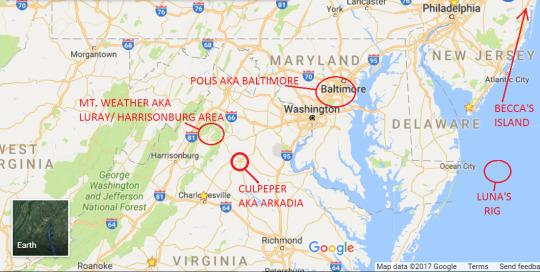
Polis=Baltimore/ Dc, looks a little above DC based on the Bay. It makes sense for Polis not be in DC because Trikru is. Tondc/ Ton DC was like “Washington DC” on a road sign and Lincoln got his name from the Lincoln memorial, which we get a glimpse of in S1.
Mount Weather= Looks to be around Luray area- which is really interesting to me because the cave/ tunnels would check out. A caving plug: Luray and Grand Caverns have really great features, but they’re dead. Railings and steps and lights have been put in everywhere to make it more accessible for folks, but more importantly to bring in a ton of money. To see Living caves in the valley, my brother is a cool dude who takes his students- and more importantly me- to see neat things without harming the cave like some punk ass bitch yanking stalactites off the ceiling.
Arkadia= Looks to be around Culpeper… but if it was slightly more south (because the map Raven has is shit, but I’ll get to that) I could argue it’s between Charlottesville (!!!) and Culpeper, although more towards Culpeper. Like Orange/Madison counties. Literally no one cares about this but me because that is my homeland. Also TJ, Monroe (the president, not the dead character from this show that I should get back to…), and J Maddy-Mads. Zach-attack (this also works because he was a major general, not just for the rhyme) Is actually the closest to Arkadia- his house is in barboursville which puts him 25 min closer to Culpeper than TJ and Monroe. GW is up by Ton DC. Wilson is southwest of Arkadia. I don’t know/care enough about where Tyler and William Henry Harrison were from and I’m not going to look it up. This history/ geography lesson was brought to you by the Mother of Presidents, and viewers like you. Thank you.
Luna’s Rig= Somewhere off of DE/NJ coast. They might go back there, but otherwise I honestly don’t care where exactly the rig is. Like. Nyko just said that 40 people died on their way to Arkadia and Luna’s like this is all that’s left of my people. Soooooo… sorrynotsorry
Becca’s Island- I struggled figuring out what that said. I’m leaning towards it being a fictional island because the only thing I can think of it being is Sandy Hook. However, there seems to be land in the bay, soooo Sandy Hook would be part of the continental land mass instead of an island. If the picture wasn’t so wonky the only argument would be for Sandy Hook. I believe it’s only listed here because it will become plot relevant later this season when the tech team decided they need to access Becca/ A.L.I.E.’s drone or something to monitor radiation.
Note: The coastlines don’t match up perfectly. At first I was excited they’d taken rising sea levels with climate change into account, but that should make the bay larger and thus the gap between eastern Maryland/ Delaware and DC larger. So some of the Virginia coast looks good, but the east coast is on a passive margin (I took Geology guys can you tell), which means that it’s not colliding into another plate and thus being squished in on itself or mountain building (this is happening in the middle of the Atlantic) like on the U.S. west coast. But at the end of the day, I don’t think they really considered this when creating that map because 1) some areas are larger than they are now (like Long Island is now a peninsula instead of an island), indicating receding seas while 2) some coasts are cut off indicating rising sea levels. Basically. They would have been fine using a regular map from the internet. Not sure why they decided to render this shitty one or what purpose making their own serves. Maybe they don’t have rights to steal from the internet…?
You, the reader are now thinking, “who the fuck cares? That map was visible for under 30 seconds. all we were supposed to recognize is that it’s the VA/DC/MD area. Let’s move this train along I want to hear about things that actually matter.” And to this I say, you are not wrong. Let’s go. This 15 sec clip took me an hour to analyze and I’m not proud.
[Resume reading non-geography post here if you skipped. There were some jokes in there... not good ones]
Bellamy’s face at “choosing who lives or dies is your specialty” Ouch. Clarke can’t get a break. First Jasper, now Raven. Good thing he’s always on her side.
Someone’s taking the rover. My gut thought: is it fucking Jaha? Oh wait. Jasper’s problematic too and would pull that. Nope. Fucking Jaha. Your gut is always right.
Naturally, radical Jaha who went off to find the city of light is not encouraging a trip to go find a doomsday bunker by a religious fanatic. Raven is the skeptic voice of ME. Like hey guys, remember when he did this last time? If it’s not real Clarkiepoo gonna make that list. I like
DOOMSDAY CULT MAN SAYS “there is a way out of the darkness. I can show it to you. You can be saved. Join me…” okokokokokok. Abby stays behind in Arkadia to show them the way out of the darkness. Then she is forced to take the chip and gets the rest of the camp to join her in the CoL. Coincidence? I THINK NOT.
DAD AND NATE ON GUARD DUTY TOGETHER. MY HEART. DAD MILLER IS GREAT. I like Miller Sr.
Raven x Abby
Alright. Time to defend mom. Raven’s position of wanting to save the pills- because it’s too late for them to work on Luna’s people- is understandable. Abby’s desire to save people is also understandable. I happen to love Raven x Abby scenes because they’re both so stubborn and both usually have equally strong, but different arguments. Dr. Abby probs should not have told her eldest daughter she’s killing this child. Howeverrrrr my mother, Abby, and even I, with my son VPJB, understand the power guilt has over your children. My son tried to attack a shadow for 45min today so I’m still choosing my battles. Back to the show- the emotion they bring as actors is fantastic. I’d like to pull their history out of the back of your head. Abby and Raven meet because they both have someone who went down in the dropship they desperately want to see. They bond. They trust each other and sass each other and Abby tells Raven to go down without her. Raven tells Clarke how great her mom is at a time when Clarke thinks floating Jake is still 100% her mom’s fault. Raven gets shot, Abby frickin saves her life and she only has one lame leg instead of being paralyzed from the waist down. Kudos Dr. Abby. BUT. Raven hurts, and chronic pain is rough on people, so you’ll lash out. Raven calls Abby out for being a crappy chancellor and doctor. Abby hits her. She’s instantly sorry she lost her temper and they’re distant but not terrible. Despite some heated moments, they’re fam. Abby adopts everyone she sees, and Raven, with only Finn in S1 becomes family. Then Finn dies. Then her mentor Sinclair (who I really really really really really liked and wish got more developing prior to THAT episode [sidenote: I hate when secondary/ tertiary characters get developed just so they the audience feels some emotional investment that turns into pain. Especially within the same episode. Except they’re only there for that one episode to drive another character’s development as in the dying child (Adrian) Luna brought.], so now Abby and her friends are all she has. There’s love there, which doesn’t make talking to each other ok, but I’m confident they’ll forgive each other. It hurts more because of the love.
Murphy steals medicine to help a sick kid. Important because his father got floated for stealing him medicine when he was a sick child, and the medicine ended up not working. Abby knows better than to ask where he got it. She’s broken the law to save people before. Yay Jackson being sweet with this child. I frickin love Nyko too. He’s one cool dude.
Octavia x Indra x Gaia
Mom saves her daughter. Octavia is like oh nooo here let me help you up, my b. Another mother daughter conflict. But this time really related. Indra: My daughter was meant to lead armies. My daughter was meant to lead our people. Me and Gaia: looks like you got that after all. This scene was great. A parent who cannot understand their child. So common and yet this is the best portrayal of that I’ve seen, mainly because it wasn’t “But basketball’s your dream!” “No, Dad. basketball is your dream, not mine!” Octavia comes up with a plan to save the flame and Indra’s daughter. Loyal to Indra over Roan. I love that. Ilian’s sledgehammer was entirely too dramatic. Should have spent the money used on that effect for Raven’s map. I’ve got a bone to pick with Kirk Douglas or Michael Cliett- whomever was in charge of that. Not bitter. Omg Gaia is so sweet and lovely. I love her. I want her to stick around. Don’t let the radiation get her!
Bellamy + Clarke x Jaha
Leadership is lonely, it’s good she has you. You keep her centered. Obviously Jaha sees Clarke as the leader and Bellamy as her sidekick/ compass more than an equal? I feel like they co-lead well Together. Wink. You’ve got it backwards. Nice. But Jaha is giving Bell some questionable advice here- he’s saying stop blaming yourself for the massacre, you were doing what you though was best for your people, and as long as that’s true, you don’t need redemption. Sort of, Jaha. You may think you’re right, but someone is yelling at you that you’re wrong (i.e. Abby x Kane S1 culling, Kane x Boris S3 massacre), so you actually might need some redemption, maybe for your people to accept you, maybe for your soul. Kane goes off in search of redemption and atonement after he realizes the way of life on the Ark doesn’t have to be how life on Earth is. Bellamy, realizes slaughtering a village of non-militant grounders is wrong as he’s taking part in it. That’s why he convinces Pike to let Indra live. Yes, they both think they’re right, but when they realize, even in hindsight how wrong they were, they feel guilty. Jaha on the other hand is very set in this “That’s what I thought at the time and I won’t let the present change how I see my past actions.” He’s much more cold and cognitive than emotional, even with himself. Jaha’s all like, dude get over it, how many people do you have to save before you forgive yourself.
I’d say Jaha has been distant enough in that he’s been off by himself for most of the plot, or at least separated from the core group, to merit his comment on the state of Bellamy and Clarke’s relationship seriously. He has plenty of background with Clarke- his son was her best friend, their families were close pre-S1. Anyone can see Bellarke works well together, but Jaha’s outsider-insightfulness that everyone else may be too close to see (or too close to tell one of them) is that they center each other.
The List
First, can we talk about the Kabby couch parallel? Abby is snoozin at the start of S3 so peacefully and Kane glances over before going back to his sector mapping. ON THAT SAME COUCH is a peacefully sleeping Bellamy for Clarke to glance over at. He makes the list. I wonder if Riley did. Is Clarke reserving spots for grounders too or just sky people/ people in Arkadia? Bellamy gets spot 99. Good. Awe. He writes her name for her. Good job. Bellarke fans are screaming. Now we put it away... Y’all did a bang up job of that. Fold it once and put it in the OPEN CUBBY of the desk? No one will ever find it there. Snooping Jasper and Monty looking for their long lost weed never will. Oh wait.
Funny how we’ve got another group of “100.” It’s always good to remember your roots.
End Thoughts Me: SHE’S A NIGHT BLOOD YOU DON’T HAVE TO RUN TESTS ABBY (and also you could have said “I’d like to run tests” slightly less creepily to a person who’s not the biggest fan of technology.) Abby and Clarke 20 seconds later- yeah there’s another variable here. yeah she a nightblood. Very happy Jackson got so many lines, even if they were tiny and sometimes in the background, he was in the conversation.
Noteworthy Absences and How I Feel About Them
Marcus Kane- I knew it was coming. I’m sure something big is happening with Octavia in the next episode. I thought the balance between Polis’ Octavia x Indra plot was well balanced with the Arkadia and Jaha x Bellarke plots. They were all satisfactorily interesting, a relief after Jaha’s 2B/3A plotlines. Adding a diplomatic Kane plot would be too much. He would have crowded Indra and her daughters’ scenes too. I’m good, but he was missed.
Harper McIntypre- She could have been standing guard with the Millers? Nate and Harper are besties. I like it. But then I want her to develop, so I’d rather her sit this one out and have meaningful airtime in another (or the next) episode.
Bryan- Also could have been on guard with the Millers. I actually would be really interested in seeing Bryan and Sergeant David Miller interact. Then again, He and Nate just had a fight last episode over fundamentally different beliefs, so they need air. In this case I do NOT want to have Miller Sr. interacting with them. He’s already had enough awkward interrupting couple-moments. I think he needed to be absent. There were already three plot lines and Briller drama would have pulled the show in too many directions, as with Kane. I’m cool with that.
Monty Green/ Jasper Jordan- This was a mother-daughter conflict episode with a splash of following Jaha’s whims. They didn’t fit. I’m cool with that. They’re going to find that letter Clarke should have hid in her pillowcase next week.
Echo- I’m bitter. She should have yelled at someone. What a badass.
Riley- Who is this dude. I just looked on IMDb and he’s in 6 episodes. Everyone seems to know him. I need to be part of that.
I felt we needed a refresher on full names…or lack there of...
I have no life and am very lonely. But it’s my own fault. so that’s just a nice explanation of why I have time to do this...
6 notes
·
View notes
Link
An important intellectual debate is currently playing out involving the French ambassador to the United States — and a late-night comedy host.
During a Monday monologue, Daily Show host Trevor Noah made a joke about France’s World Cup victory. Alluding to the fact that 80 percent of the French team’s players were of African descent, he quipped, “Africa won the World Cup.”
“I get it, they have to say it’s the French team,” said Noah, who is black and South African. “But look at those guys. You don’t get that tan by hanging out in the south of France, my friends.”
French Ambassador Gerard Araud took offense to the comments, and sent a letter to Noah on Wednesday afternoon outlining his complaints. “By calling them an African team, it seems you are denying their Frenchness,” Araud wrote. “This, even in jest, legitimizes the ideology which claims whiteness as the only definition of being French.”
That evening, Noah fired back in a web segment, defending his original joke and arguing that Araud was actually erasing the identity of his nation’s players. It’s a powerful monologue, despite Noah’s attempt to imitate a French accent at the beginning, and deserves to be watched in full:
Ultimately, this isn’t an argument about one joke. It’s a debate about two competing visions for how liberal societies should handle diversity and racism.
Araud is coming from a traditional French perspective, and his argument can’t be understood without grasping the very aggressive vision of assimilationism that’s been dominant there for decades (arguably centuries). Noah understands this, and in his response offers a critique of traditional French approaches to diversity from a progressive, multicultural point of view.
The core issue at stake is deep and philosophical: a divide over the fundamental role of diversity in democracy, one that explains, among other things, a major part of the debate over “identity politics” currently raging inside the United States.
So even though this incident started with one comedian’s joke, it’s worth taking quite seriously — as it tells us a lot about modern politics.
French Ambassador Gerard Araud at the UN. John Moore/Getty Images
The core of Araud’s response to Noah’s initial joke was to argue that the comedian doesn’t really get what it means to be French.
“France is indeed a cosmopolitan country, but every citizen is part of the French identity and together they belong to the nation of France,” Araud writes. “Unlike in the United States of America, France does not refer to its citizens based on their race, religion, or origin. To us, there is no hyphenated identity, roots are an individual reality.”
This approach to race, which may sound bizarre to American ears, reflects widely divergent histories: George M. Fredrickson, an eminent historian of race in France and America at Stanford, dates the origins of the Franco-American disagreement over race all the way back to independence. For a complex of reasons — ranging from differences over the role of the state to the two revolutions’ differing experiences with religion — America developed a national culture centering on liberal tolerance, whereas revolutionary France focused more on building a shared sense of national identity and unified culture.
The two countries diverged further as they developed. Because France had no large, domestic slave population, preferring instead to enslave Africans in its colonies, race never became the fundamental cleavage in its politics. While both countries experienced mass immigration, immigration to the United States has featured much more non-European migrants (until, roughly, the end of colonialism in the mid-20th century). It was also far easier for immigrants to the US to become citizens without learning the local language and culture.
The result of all of this was that French national culture came to view matters of diversity and immigration as issues centering less on tolerance than on assimilation. As Fredrickson puts it:
Recognizing the role that race has played in producing group inequalities, the United States has adopted race-specific policies such as affirmative action and electoral reforms designed to promote greater representation for minorities. After a brief experiment with multiculturalism in the 1980s, it would appear that France has decisively rejected “the American model” and resolutely returned to an assimilationist approach to the diversity created by the new wave of immigration.
This history means that traditional French liberals — the camp in which Araud is best situated — have a very particular approach to race and racism.
They believe that the best way to convince French citizens to accept diversity is to convince French whites that Muslims and people of African descent are every bit as French as they are. Playing up their ethno-religious differences, they believe, only serves to distance them from their essential Frenchness. What’s worse, they argue, it fuels a narrative on the French far-right that people who aren’t European by blood can never truly become “French.”
Hence why Noah’s joke about “Africa” winning the World Cup rankled so much. Benjamin Haddad, a French scholar at the Hudson Institute who has worked for President Emmanuel Macron, told me that it sounded like the rhetoric he hears from far-right party leader Marine Le Pen.
“His [Noah’s] original skit, ‘you don’t get that tan in the south of France,’ is Le Pen level stuff,” explains Haddad. “Many French cringe at this debate because it’s been a far-right talking point for 20 years.”
Trevor Noah is, of course, coming from a different perspective. A black South African man working in the United States, he’s steeped in the culture of two countries whose entire existences were defined by race and racial oppression. Both nations have, in different and distinct ways, developed official cultures of multiculturalism — a celebration and accommodation of racial differences, rather than an erasure of them — as a means of trying to reconcile racial tensions.
Noah’s response video is essentially an extended defense of this model and a head-on critique of traditional French assimilationism. For one thing, Noah argues, the French model erases the positive pride that Africans, both on the continent and in the diaspora, feel in their common heritage.
“Coming from South Africa [and] watching the World Cup in the United States of America, black people all over the world were celebrating the Africanness of the French players,” he said. “Not in a negative way, but rather in a positive way going, ‘Look at these Africans who can become French.’ You know what I mean? It’s a celebration of their achievements.”
“When I’m saying they’re African, I’m not trying to exclude them from their Frenchness but include them in my Africanness”
In Noah’s view, insisting that you can’t hyphenate your identity — that you can’t be French-Algerian, but must be either French or Algerian — cuts people off from a valuable sense of pride and community. It’s a vision that strips people of who they are, and of what matters to them, in the name of “assimilation.” A quote from Count Stanislas–Marie–Adélaide de Clermont, offered during the 1789 French National Assembly’s debate over the legal status of Jews after the Revolution, helps sum up what Noah finds objectionable about the French model:
To the Jews as a nation, one must refuse everything; but to Jews as men one must grant everything…there cannot be a nation within the nation.
The idea that you cannot have a Jewish community in France, only individual Jews stripped of their Jewish identity, sounds profoundly offensive (at least, it does to this Jew). But Noah argues that Araud, and French national culture, hasn’t moved on from this 19th-century view — that insisting that hyphenate identities are impossible is stripping communities of their core, essential identity.
The point about the far right, Noah argues, is missing vital context. The same line — “these are African players” — means something very different when it’s being said by a black comedian than by a racist French politician, and that audiences are smart enough to understand why:
I believe context is everything. There are certain things that you can say — like, when I say to my friends, ‘What’s going on my nigga?’. And if a white person came and said the same thing, yeah, there’s a big difference. When I’m saying they’re African, I’m not trying to exclude them from their Frenchness but include them in my Africanness.
So the issue here, contrary to Araud’s point, isn’t that Noah fails to understand the French model. It’s that he thinks it’s wrong.
End of the argument with @Trevornoah He didn’t refer to a double identity. He said »they are African. They couldn’t get this suntan in the south of France ». i.e They can’t be French because they are black. The argument of the white supremacist.
— Gérard Araud (@GerardAraud) July 19, 2018
My own view — cards on the table — is that Noah is the winner in the debate. Araud continues to restate his basic position, even in the tweet above sent after Noah’s response was released, without grasping the subtlety of Noah’s points about context and identity.
But I’m less interested in point-scoring, at least right now, than I am in pointing out the stakes of the argument.
While Araud’s specific arguments are grounded in French identity and history, his basic starting point — that the best way to approach issues of race is a kind of colorblind emphasis on what unites us as citizens — is the same argument that underpins liberal critiques of “identity politics” in the United States.
After the 2016 election, Columbia University professor Mark Lilla wrote a New York Times essay, “The End of Identity Liberalism,” making an argument similar to Araud’s (a piece that also follows a long tradition of liberal handwringing about identity in the US). In the piece, Lilla even cited his time taking a sabbatical in France as formative of his opinions on this subject.
American liberalism’s emphasis on identity and difference, Lilla argues, is destroying the foundations of democracy in the country — helping the far-right in precisely the way that Araud says:
The standard liberal [view] for nearly a generation now has been that we should become aware of and “celebrate” our differences. Which is a splendid principle of moral pedagogy — but disastrous as a foundation for democratic politics in our ideological age. In recent years American liberalism has slipped into a kind of moral panic about racial, gender and sexual identity that has distorted liberalism’s message and prevented it from becoming a unifying force capable of governing.
Lilla proposed replacing “identity politics” with a “post-identity liberalism,” one that speaks “to Americans as Americans … a nation of citizens who are in this together and must help one another.” His proposal, in short, is to Frenchify American liberalism.
Critics of Lilla’s position replied that this would be electorally ineffective — Democrats need minorities, and need to appeal to their particular identities to get them — but, more fundamentally, that it would be wrong.
“What we find in the backlash by liberals against progressives is nothing other than a betrayal of the true and full values of liberalism,” Stanford professor David Palumbo-Liu argued in a Vox essay. “Liberals like Lilla would have us turning back the clock to compete for the leadership of what one might call an ‘off-white America,’ with issues of race and gender and other minority positions relegated to the background.”
This is a more explicitly political twist on Noah’s position. The comedian is arguing that stripping French World Cup players of their Africanness means separating them from an important part of themselves; the professor is arguing that removing identity politics from liberalism is to remove the specific concerns of marginalized groups from the political docket. Both believe that a colorblind liberalism is one that has blinded itself to important parts of what matter to individuals from minority groups.
What’s really at stake here, then, isn’t just a petty feud between public figures — or even a culture clash between two men of different backgrounds. Instead, it’s a profound debate splitting liberals in increasingly diverse democracies — both in Europe and the United States.
Original Source -> Trevor Noah’s feud with France over race, identity, and Africa — explained
via The Conservative Brief
0 notes
Text
DECONSTRUCTING ANCESTRAL EVE
Fearless Eve
Genetic anthropology demonstrates that human populations have been on the move for the past 200,000 years. We have been migrating from continents and immigrating to countries ever since African Eve -- the first "fearless woman" walked out of Africa. As the first known female genetic ancestor of every person alive today, she proved we all share a common ancestor and therefore, all of us are related. I like to think she had a vision for herself, and for humanity and that in her quest for life, liberty and happiness, she saw the big picture. Peaceful coexistence in a world without squiggly black lines we call country borders. We do not exist without her drive, tenacity and open mindedness. None of us would. As she ambled across those planes and forests, waded through the swamps and trekked up the hills, I can't help but think that she not only had a yen for wanderlust, but a desire to do the right thing. I'm happy to trace my deep ancestry to her. We all ought to be. We've got optimistic genes in us all.
In a globalized world, people no longer move merely as a cog in the wheel of evolutionary survival. Rather, it has taken on a heightened sense of urgency for prosperity. Those arbitrary lines on our maps are man-made but the earth belongs to us all. While those lines have created fascinating cultures, humanity now seems destined for something bigger. It seems poised to transcend those black squiggles with all the ingenuity and spirituality the globalized world can muster because the globalized workforce must move across the boundaries of countries and continents to make a better life. This is the 21st century reality. Oddly enough, not every person, country or culture has caught up with that idea, especially the developed nations that practically invented this hot, flat and crowded world of moving people.
What Is Globalization?
In order to understand the globalized world, I like to share an email I received a while back by a cross-cultural colleague who said that globalization looked like Princess Diana's death. And I thought, what an absolutely morbid and inappropriate thing to say! When I asked why, he replied:"Because she was an English princess with an Egyptian boyfriend, who crashes in a French tunnel, in a German car with a Dutch engine, driven by a Belgian drunk on Scottish whisky, chased by Italian Paparazzi on Japanese motorcycles, treated by an American doctor, using Brazilian medicines. This email was sent to you by a Canadian, using American, Bill Gates' technology and you're probably reading this on your computer, that uses Taiwanese chips, a Korean monitor, assembled by Bangladeshi workers in a Singapore plant, transported by Indian truck drivers, hijacked by Indonesians, unloaded by Sicilian longshoremen and trucked to you by Mexicans." You get my meaning.
Improving the quality of life means different things to different people. Universally, though, despite cultural and religious differences, it can mean relocating for a career advancement, improving your financial future or immigrating because there are better educational and job opportunities for your kids. No matter what the reason is, people have moved, are moving and will continue to move. The pettiness of America's immigration reform xenophobia diminishes the globalized opportunities it was instrumental in creating. So it's incumbent on countries, like the U.S.A., reap what they have sown. To seize the change we have created and accept the human capital for the opportunities it creates. Yet, in my country of opportunities, success depends not only on what it can offer the world, but on what the world of people can deliver to the country they now call home.
Two-Way Street
For populations that come and go, the givers and receivers of countries, cultures and nations, there are gains and losses on both sides. There is no movement without change. No success without risk. However, this is the very process that has shaped the success of the U.S.A. and the American character. According to the cross-cultural literature, America is the most individualist-oriented culture compared to the rest of the collectivist-oriented world. Eighty percent of the rest of the world puts the needs of the group before the needs of the individual because fundamentally, people are born dependent and connected. While American individualism (or independence) may be hard to understand, it's not only desirable, but necessary.
Americans created (and practically invented) that singularly unique and remarkable quality, because they were unafraid of people moving either to the U.S.A. as immigrants, or within its borders to continue that momentum of success, achievement and opportunity, after they arrived. This mobile behavior benefits the entire planet. It's the change that fosters prosperity and improves living standards. With success comes risk and no one knows that better than a pioneer. The success of globalization has created a new reality (cooperation, synthesis). The pioneers who venture out (loss, thesis) and the host nations who receive them (gain, antithesis) form a new paradigm. People move the information, goods and services that are making globalization happen.
The "American way" of life or elevated standard of living is being aspired to by hundreds of millions of people around the world, especially the BRIC, but not as Americans understand it. We have a hard time understanding the hybrid versions of it. Many nations retain their political ideology and social values while embracing American free market capitalism. Oddly enough, like Americans, it is human nature to innovate, not copy.
On the other hand, what happens when leaving what you know behind is met with rejection? What about the perception of a "selfish" America by new immigrants? It's important to know that upon closer inspection, the pioneering mindset of the U.S.A. means that Americans take care of themselves and expect others to do the same. Independence, or self-reliance, is a key American virtue because it means to be self-supporting. Films and TV show heroes, usually ordinary individuals, save the day (or the world) by acting on their own, sometimes bypassing rules and authorities and ignoring group opinion. This is the mindset -- for better or for worse -- that paved the way for the freedom to forge a better life.
Take the Tibetans and China, the Mexicans and America, the Middle Eastern people and Europe. Each one of these cultures fears losing their cultural identity and sometimes refuses to adapt in one way or another. They have created cultural conflicts and sometimes, outright rejection by the host culture or, on the other hand, may be a result of the immigrant rejecting the notion of total assimilation which was commonly adopted during the mass wave of immigration to America during the 19th century. However, those immigrants also chose to move here for a better future. It's a two way street though, and the nature of immigration is changing. How and why people move, migrate and immigrate, and when and where they will go continues to unfold.
If scientific evidence tells us that the journey of our fearless African Eve was driven by insufficient resources, food and land, then not much has changed. Today people still move for much the same reason, only now it's with a heightened sense of peace and prosperity. This is what it means to get globalized, fearlessly. To be unafraid to pioneer the idea of lifting yourself up and out of your current state of being, wherever that may be.
While America is no longer considered a "melting pot," it is still a country where there's a high chance of engagement among people of other cultures. Now we use the "salad bowl" metaphor, symbolizing the American Kaleidoscope -- in which different cultures mix, but remains distinct. At the same time, the days of the Great Wall of China or the Berlin Wall mindset of isolation is all but gone with the exception of countries like North Korea. People, countries and cultures that resist globalization, erecting barriers, are failing to ride the waves of culture and miss the opportunity for a better future. All that's left is the useless ethnocentrism that isolate and limit subsequent generations who may feel lost without a sense of belonging anywhere, much less cultural identity. What was considered home for one generation, may be something very different for another. While it's understandable that change brings uncertainty, tolerating risk comes with the territory of pioneering new frontiers.
Face It
This is the spirit that welcomes differences -- like America can -- along with new ideas and a different type of unity, one that may not be visible just yet, but may be looming, just over the horizon. Just as African Eve could not know what future she would bring humanity, our future may also unfold in ways we cannot imagine either. It may be that the globalization which first emerged from the American shores may evolve into something quite different. A hybrid of where we are now, if we move with the process and get out of our own way. One driven by the pioneering engine of Western style capitalism, atomized and individualistic, yet feel more Eastern and transcending, coexisting peacefully and harmoniously.
Some nations embrace the global movement of information, goods and services. Others may resist it, but undoubtedly humanity is the face of it. Whether nations embrace open borders for opportunities to improve living standards or they restrict them (and the potential revenue streams) it seems to be about fight or flight. A fear of losing part of ourselves or a perceived insecurity without a firm cultural identity. Perhaps we can transcend the impermanence of these man-made notions of what it means to be human because we think they preserve us and our species. However, we know that cultural values are learned behaviors and they can be unlearned however ingrained, but this takes time.
His Holiness the Dalai Lama said, the world is becoming smaller and one can easily recognize that everyone on earth is connected. We all suffer and experience joy. To meet the challenges of our times, though, we must develop a greater sense of universal responsibility. In a globalized society, we can find strength through that connection and forge a pathway to peace and prosperity for all.
1 note
·
View note